Josh Fox’s New Film ‘Awake’ Is a Case Study in Resistance
The "Gasland" director explains why activism rooted in peace is essential to counter cultural endorsement of violence, repression and corporate domination.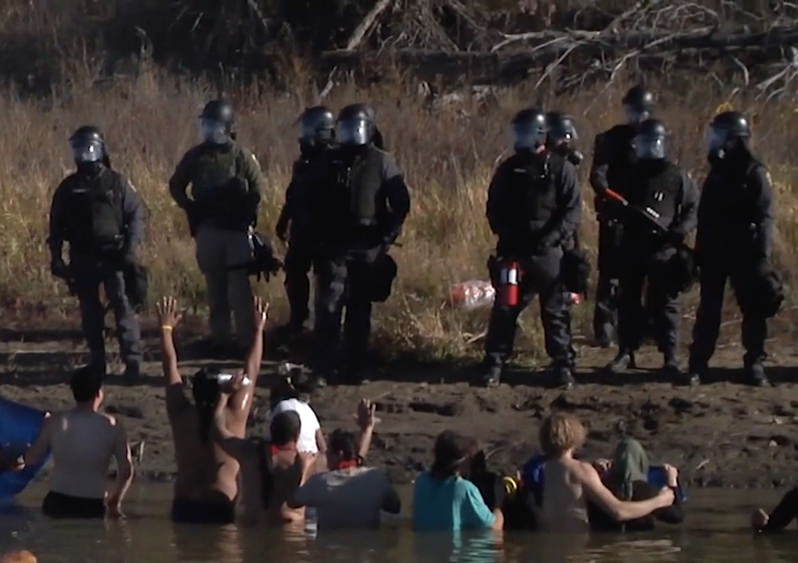
Last year, the Standing Rock Indian Reservation in North Dakota was transformed into Ground Zero for America’s environmental justice movement, as indigenous water protectors from local communities and activists from across the nation joined together to protest the construction of the controversial Dakota Access Pipeline. A new documentary, Awake: A Dream From Standing Rock, produced by filmmakers Josh Fox, James Spione, Myron Dewey and Floris White Bull, captures some of the stories that emerged from #NoDAPL, the native-led resistance against the Trump-supported pipeline, which is slated to transport around 470,000 barrels of oil a day from the Bakken shale oil fields in North Dakota, through South Dakota and Iowa to an oil tank farm in Illinois.
I had a chance to chat with filmmaker Josh Fox, director of Gasland, the 2010 Emmy Award-winning documentary that helped launch the anti-fracking movement, about his new film.
Reynard Loki: What’s the goal of your new film, ‘Awake’?
Josh Fox: Like all my projects, it’s doing double duty. It’s a document that I think is extremely important in terms of a historically significant moment in our history and at the same time it’s motivating people in this moment to continue to participate.
RL: Were there any surprises?
JF: Yes, the film does something we didn’t expect it to do. Originally it was trying to be an activist piece that got people all excited, and what it turned into was a very poetic piece that is very lyrical and dreamlike; it transports you to being at Standing Rock and being in that moment of all of the violence, of the police—but also what it looks like to have an operational sense of peace, and an organization working with these concepts of peace and different values.
RL: Floris White Bull is the film’s narrator. Her voice has a powerful presence.
JF: I realized that hers was a voice that really needed amplification. When I started thinking about the piece, I had all this footage and I was working on a documentary, but I realized that this isn’t my dream. My teacher in theater is Anne Bogart, and one of the wonderful things she always said was, “When you’re doing a play or you’re working on a project, find out whose dream it is.” I realized that as a white man myself, this is not my dream.
Even though I was a very integral part of those protests, and certainly there’s a history of working on fracking in Gasland and all issues related to fossil fuels, I thought, this is not my dream; this is Floris White Bull’s dream. I asked her, what do you think about working on this together? It really is a collaboration in that way, that we got to write that together.
RL: Can you elaborate on the dream analogy?
JF: The idea that the last 500 years of what we call civilization might be thought of as just a bad dream—when you think of 20,000 years of obviously Native Americans on this continent— that was some of the premise. Then it became this idea of what are we actually “awake” to. What’s actually happening on the ground? How do we take that metaphor and make it into a dreamscape?
RL: This is unlike your previous films, where your own voice is central.
JF: In the small part of this film that I direct, I wanted to make sure that I gave that over to the voices that are important. Like Doug Good Feather, a two-term Iraq War veteran, who said that when he got to Iraq he realized very quickly that it’s not about terrorism, but oil. Or Malia Hulleman, who’s from Hawaii, who’s just a remarkable presence in the world, talking about Thanksgiving as “Thankskilling” and “Thankstaking,” and that Thanksgiving is actually a massacre, so reporting from Standing Rock on Thanksgiving.
These are the voices that I felt were most important to highlight, and I didn’t want to do the stereotypical Josh Fox project.
RL: The Standing Rock encampment has been cleared. What’s the next step in the resistance?
JF: There are five points that we’re advocating right now. The first one is resisting the pipelines that are happening all across America now, many in places where there’s definitely an indigenous sovereignty issue. The Bayou Bridge pipeline in Louisiana. The Trans Pecos pipeline in Texas. The AIM pipeline in New York. The Atlantic Sunrise pipeline in Pennsylvania. The PennEast pipeline in Pennsylvania and New Jersey. The Sabal Trail pipeline in Florida, where there’s a protest camp being built right now in the Everglades. There are these fights, and we are encouraging people to get involved. That’s number one.
The second point is that we want people to resist—period—against Trump and his policies. You’re seeing a resurgence of the ACLU, the climate movement, the fracking movement. I hope we’ll see a resurgence of the anti-war movement, because that’s got to stop. We have to mobilize, and we have to work together on all levels, not just on pipelines.
The third point is that we want people to divest. Divesting your own personal funds, your school, your corporation, your mom-and-pop shop, your non-profit. Get your money out of the big banks, like Chase Wells Fargo, Citibank and Bank of America, which all fund oppression of indigenous people and fossil fuels. Your money doesn’t just sit in these banks; it does awful things while you’re not paying attention—it’s buying rubber bullets to shoot at journalists and Native Americans and independent documentarians, financing coal projects and fracking projects and pipelines.
The fourth point is that we have a crisis with respect to the water protectors. There’s a water protector facing serious charges, and those need to be fought back on a legal front. It’s on our website. You’ll be able to see the Freshet Collective that’s defending water protectors in court. Doug Good Feather, our executive producer, is the executive director of the Lakota Way Healing Center. He’s a two-tour Iraq War veteran who suffered from PTSD. He has a degree in psychology and counseling, so he knows Western psychology, but he also does Native ceremonies for healing as a part of their healing tradition. We need help for our water protectors’ mental health. A lot of people are deeply traumatized.
Related to this is the fifth point: donations. With respect to the film, we put the film out with no middleman, direct to the public. You can stream the film at our website, awakethefilm.org, and the money goes directly to an indigenous media fund. We need more indigenous media voices in the media, so we’re helping to sponsor that. There’s a pipeline fighters fund, which helps the pipeline protest camps that are going forward. We hope that we have hundreds of thousands of dollars in donations toward those funds, because we want to see that work continued.
RL: How does Standing Rock help provide a template for other resistance battles?
JF: It’s not always just a question of fossil fuels versus renewable energy. It’s a clash of values. That’s very clear in Awake. You have a nameless, faceless, militarized occupation force clad in riot gear; I don’t even want to call them police, because they have no name tags. They were allowed not to wear name tags. In many cases, you can’t see their faces because they have these riot shields, violently acting out against peaceful people who are praying, trying to stop a pipeline on their own land.
This is 400 years of oppression playing itself out right in front of us. There’s never been a clearer example of a structural value-based problem. Our civilization values violence, oil, repression, consumerism, individualism, competition, corporate domination. The opposition values prayer, peace, generosity, community, love, giving to each other. This is a clash of these indigenous values versus the United States’ “values.” I think that Standing Rock does help provide a values-based template, whether or not those are manifested in a protest camp that lasts for months or in a single-day blockade.
Indigenous values are in the lead, and they have shown us that way. They’re very in line with our American civil disobedience, non-violent direct action traditions from Martin Luther King, Henry David Thoreau, and Susan B. Anthony, outside of the U.S., obviously Gandhi and Nelson Mandela. These are real truths, and they are in that indigenous community, and they are a part of that value structure that we as a capitalist, corporatist society have continually betrayed.
If we’re going to survive in a future on the planet where we have clean water and no climate change, we have to start being more peaceful. We have to start being more communal. We have to start being more generous.
RL: In the film, Floris White Bull said the Standing Rock camp was a place to relearn lost values.
JF: She says, “One of the things that Sitting Bull said was if a man loses something and he goes back to get it, he will find it.” She’s saying, “This is a place for us to rediscover values that we’ve lost. That’s why it’s home.”
One of the most moving things in my experience at Standing Rock was when you came back to camp. You would leave camp and go back and forth from camp, go to the casino or whatever it is that you have to do. I was going back and forth to the casino a lot, because I had to upload the footage, and at the casino was where you had WiFi. Then you’d come back, driving up to the front gate. The water protectors there would look in your car window and say, “Do you have drugs, or alcohol, or firearms?” You’d say, “No,” and they would say, “Welcome home.” I still want to cry just thinking about that.
RL: Can Standing Rock be seen primarily as an issue of indigenous sovereignty and secondarily an issue about the environment?
JF: That’s an appropriate way to see it. At the same time, we all have that lesson to learn in the climate movement, in the fracking movement, from that value system. That is the way out. The solution to climate change and fracking is not solar panels. Sure, that’s a part of it. But primarily it’s about changing our value system.
RL: How did your time at Standing Rock highlight the clash of values?
JF: I can remember leaving Standing Rock after being there for the first week that I was there, when we had been shot at with rubber bullets and tear gas, and all that stuff on the front lines. Living in the camp, where you have no electricity, and you have a communal sense of working together, and this incredible, beautiful gathering of people, where there was 10,000 people there my first week that I was there.
Then, leaving to go to suburban Mandan and that part of white North Dakota, and encountering strip malls, Chuck E. Cheese, Wendy’s and these other concrete, utterly, abhorrently stupid and ugly and bad-for-you type places. I thought, Is this the thing that we really wanted to create when we destroyed this culture that was native to these Great Plains? Isn’t this the most empty and ugly and disgusting thing we could create? Then I thought to myself, wouldn’t it be worse if genocide created something beautiful?
When you look at that utterly despicable, empty, shallow landscape, which is white suburban mall culture, you have to go, This is the product of a genocide, and therefore dismantling it is also addressing our history. It is also the greatest misallocation of resources in the history of the universe. It makes no one happy. You have to truck every single thing in. The food is bad for you. It’s impossible to have a quality experience.
That, in contrast with the spirituality and the values on display at Standing Rock, where you have campfires every night, and people singing and dancing, and sweat lodges, and all these amazing people from all over the world. There was true multiculturalism on display there. It was so clear what work we have to do.
RL: Where does President Trump fit into all this?
JF: Donald Trump is the embodiment of these empty values. He is infinite lack. He will never be happy. He just wants a new trophy wife, another golden toilet seat, another scam and another billion dollars. That culture doesn’t make us happy. That oil doesn’t make us happy. Going back to the things that actually do make human beings happy is a good idea.
RL: Where does Standing Rock fit in the progressive movement?
JF: I think the popularity of Standing Rock comes directly out of the Bernie Sanders movement. The same people were involved. It sprung up in popularity at exactly the moment when Bernie was no longer a political candidate. For my first Standing Rock rally, I was invited by Shailene Woodley, who was another one of those Bernie Sanders surrogates on the road with me and with Bernie. She said, “I’m getting involved with this.” We had just done Climate Revolution in Philadelphia, and we’d just been at the DNC together, and August 5th, we did our first Standing Rock rally in Union Square in New York City. The youth council ran from D.C. to Union Square, and that’s some of the first footage that I shot for the film.
As soon as it was Hillary’s nomination and the race was on, a lot of that Bernie philosophy and those people saw and found a home with the Standing Rock struggle. Shailene had a lot to do with that. She really popularized that. That Bernie revolution, that political revolution, is very much alive in America. Bernie Sanders is the most popular political leader from America, in America, and in the world today, not Donald Trump. Donald Trump is probably the least popular. America wants Bernie Sanders, or at least they want his values.
RL: How does racism play a role in this clash?
JF: There’s a real racism deep within the system. It was racism that permeated the entire spectacle at Standing Rock, whether it was the cops acting in very violent ways against old women and men and elders and children, that I doubt they would have done against white suburbanites. Racism prevented coverage of Standing Rock by CNN, MSNBC and the mass media. Racism in the court system brings on these people incredibly hefty charges which are totally inappropriate, calling water protectors “rioters” when all they’re doing is standing in the road praying.
If these protests were situated in a white, suburban neighborhood, I don’t think that you would have seen the same type of issue. These water protectors were young kids, all places, races, and creeds, in freezing North Dakota water up to their waists, standing at the burial ground, saying to the police, “We’re praying for you. We want your children to have clean water also,” and then getting pepper-sprayed. It was really remarkable to witness that. I felt like the United States lost all legitimacy on that day.
Your support matters…Independent journalism is under threat and overshadowed by heavily funded mainstream media.
You can help level the playing field. Become a member.
Your tax-deductible contribution keeps us digging beneath the headlines to give you thought-provoking, investigative reporting and analysis that unearths what's really happening- without compromise.
Give today to support our courageous, independent journalists.
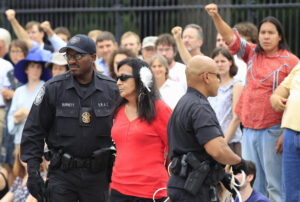
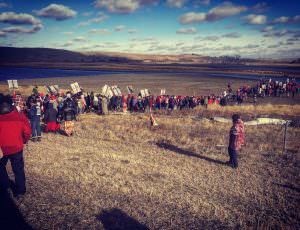
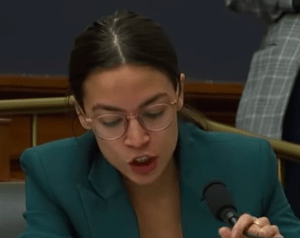
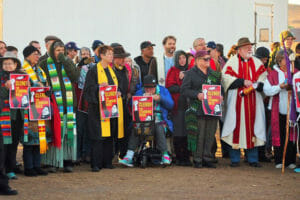
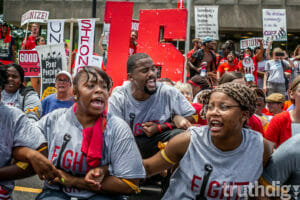
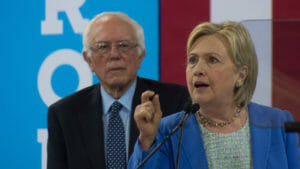
You need to be a supporter to comment.
There are currently no responses to this article.
Be the first to respond.